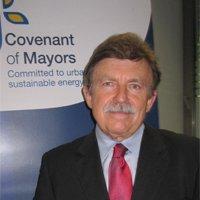July
Covenant of Mayors in Poland: From promotion to consolidation

Interview with Zbigniew Michniowski, President of PNEC and Deputy-Mayor of Bielsko-Biala. First Covenant Supporter in Poland, the Polish Network Energie-Cités (PNEC) is a strategic partner of the Covenant of Mayors initiative in the country, where the association has been active for nearly 20 years, supporting its member cities in their quest for energy sustainability.
Through facilitation of knowledge transfer, organisation of various events and extensive liaison with the Covenant of Mayors Office, PNEC is remarkably fulfilling its role as Covenant Supporter, consolidating the implementation of the initiative in the country.
Considering there are only 15 Covenant Signatories in Poland - including Warsaw, the capital, - the efforts invested by the Polish network ought to be vigorously pursued, so as to support the adhesion of an ever greater number of pioneering cities.
One the inauguration day of the EU Polish Presidency, the Covenant of Mayors Office interviews PNEC President Zbigniew Michniowski to take stock of the network's key achievements and assess the potential for Covenant expansion in this vast country.
Dear Mr. Michniowski, after two years of engagement in the Covenant of Mayors, what is your assessment of the development of the initiative in Poland?
The Covenant of Mayors development in Poland is indeed rather slow. Nevertheless, over two years since its launch, 15 Polish cities - Bielsko-Biała, Łubianka, Niepołomice, Warszawa, Raciechowice, Dzierżoniów, Bielawa, Ełk, Stare Juchy, Laszki, Gdynia, Gniewino, Hel, Kościerzyna and Władysławowo -already number among the signatories and the figure is steadily rising. Ten of these municipalities are members of PNEC, the first and probably most active Covenant Supporter in Poland. The network's main activities include widespread promotion of the initiative among local governments as well as provision of technical assistance to support the adhesion process and the development and implementation of Sustainable Energy Action Plans (SEAPs).
In the field of promotion, PNEC has been constantly active since 2009, organising major conferences and experience-sharing events. This year, we notably co-organised a seminar on National Renewable Energy Action Plans in Gdańsk, two Covenant of Mayors conferences - in Poznań and Warsaw-, the second edition of the RES Forum in Krakow and a seminar on the implementation of the 3x20 package in Sosnowiec.
On 12 and 13 September 2011, PNEC is to support the organisation of an international conference in Bielsko-Biała dubbed "Development of innovative energy - building the energy security of cities and counties" under the patronage of the Polish Presidency. In the area of technical assistance, the services we provide to municipalities range from adhesion support to assistance in the SEAP development process and translation of Covenant of Mayors technical documents.
What are the opportunities for a broader uptake of the Covenant in Poland? What are the obstacles to its development?
The root of the problem lies in the lack of funding opportunities and economic incentives for SEAP- related investments, especially as regards smaller municipalities. In addition to this, a new regulation of the Polish Ministry of Finance, introducing new rules for public debt calculation which entered into force in January 2011, is to further curb Polish municipalities' capacities to secure investment credits.
Why is it interesting and attractive for a network of local authorities to become involved in the Covenant of Mayors? What was PNEC's main motivation to take part in the initiative?
As an association of Polish cities, PNEC's activities are centred around local authorities, thus addressing the same target group as the Covenant of Mayors initiative.
Moreover, PNEC's statutory goals include the improvement of local energy policies and the promotion of energy efficiency and renewable energy sources, the only way forward to comply with the Covenant of Mayors' core objective of meeting and exceeding the EU 20% CO2 reduction target. PNEC has extensive experience in preparing Municipal Energy Programmes for cities - based on the methodology and experience acquired through the MODEL project - which makes the network well equipped to assist Covenant Signatories with their SEAP development. Another crucial element of the Covenant of Mayors approach is communication with and involvement of citizens and local stakeholders. In this field as well, our experience has proven successful as we have a strong track record in the organisation of awareness-raising campaigns, notably through the so-called "Municipal Intelligent Energy Days", all of which testify to our ability to act as a helpful Covenant Supporter.
Among all the activities you have already undertaken in the framework of the Covenant of Mayors, could you describe the one(s) you are the most proud of?
As Covenant Supporter, we also are very active on the international and EU arenas, notably through our involvement in projects funded by the Intelligent Energy Europe Program. In this context, some of our flagship initiatives include the Energy for Mayors project, which aims to strengthen the community of Covenant Supporters and Coordinators, helping selected municipalities in the development and implementation of their Sustainable Energy Action Plans. As a result of the project, it is expected that 180 new municipalities will sign the Covenant of Mayors and that 34 new Covenant Supporters and Coordinators will join the movement.
Likewise, June 2011 saw the launch of "NET-COM", another Covenant-related project we are involved in and aims at fostering the development of national and regional networking platforms and thus encourage greater experience-sharing between local authorities committed to the Covenant of Mayors objectives.
Last but not least, the project "Two countries - one energy efficiency programme" also features among our more successful endeavours. This Polish -Ukrainian cooperation, implemented between April and December 2010 and co-financed by the Polish Ministry of Foreign Affairs, aimed, among other things, to promote the implementation of the Covenant of Mayors among Ukrainian cities.
Some of the most interesting outcomes of the project , coordinated in partnership with Energy Efficient Cities of Ukraine, include a special banner exhibition entitled "Good energy" representing best energy-related achievements of Polish and Ukrainian Signatories to the Covenant of Mayors.